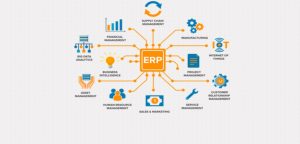Enterprise Systems – For the very first time, many firms are utilizing their ERP systems in a remote work environment. The lack of updated policies can lead to miscommunications, decreased productivity, and increased cybersecurity concerns.
Bringing your ERP systems up to speed includes assessing, updating, and automating processes and technology – as well as ensuring the training of all employees. As most of us continue to work remotely, here are critical ideas to help improve the efficacy of your ERP package.
1. Preparing for virtual training.
Compared to on-site learning, virtual training of both present employees and new hires is often more difficult and ineffective. Most ERP Software Packages include a video-recording tool and platforms for content production, dissemination, and maintenance. Following the epidemic, it appears that some ERP specialists will have left their firms.
2. Automation of Manual business practices.
To make a remote-work culture operationally viable, organizations must continue automating manual business processes mapping and approval workflows such as ordering and processing bills.
Organizations with warehouse operations may also consider automating processes such as picking, packing, and shipping to aid with the stabilization of business operations in the event of a crisis. Similarly, automated and centralized systems should replace manual spreadsheets for monitoring and prediction.
3. Anticipate alterations in financial filings.
COVID-19 will very certainly result in new accounting rules and concerns. Enterprise Systems expertise requires revealing new or odd balance-sheet line items. Some businesses that collaborate on virus-related capital projects may need to set up new reporting processes.
4. Digitize AP processing.
Because generating and presenting paper checks is difficult, many firms extend ACHCH payments to employees, contractors, vendors, and “gig” labor. Businesses should develop a governance mechanism to streamline the electronic payment process if one is not already in place. These modifications should be documented and notified to finance personnel.
5. Make more use of reporting and dashboards.
Many employees are still distant and virtual, which can cause disruptions in reporting and analysis analytics procedures and workflows. ERP solutions with dashboards and shared workflows can assist firms in handling remote reporting and quarterly filings. They can also be personalized to assist teams in managing unexpected costs, new accounting items, and financial close.
6. Ensure that Enterprise Systems are accessible.
Critical workers must have secure access to Enterprise Systems via VPN or a web-based interface. Remote management is possible with modern ERP systems. It is nevertheless vital that remote IT support setups are kept up to date and tested.
Cloud-based Enterprise Resource Planning solutions outperform on-premise systems because they are remotely run. They also provide quick scalability and flexibility for future variations in business requirements.
By and large,
Depending on your business goals, existing processes, and IT infrastructure, the ways mentioned above can assist increase the efficiency of your business which has become all remote.
Having an all-in-one ERP solution can give your company business continuity. If you’re interested in installing an integrated system in your business, Contact our Connected IT experts immediately.
Related Links
ERP Project Management
Business Process mapping
Small Business ERP
ERP Consulting



